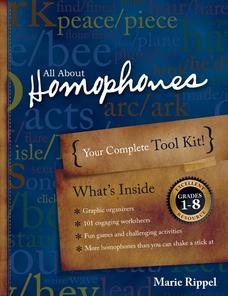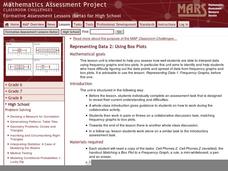Curated OER
Play or Film Review
Pupils review the elements for a successful play review. In this play review lesson, students work in groups to complete peer responses, a consensus activity, and tally activity. Pupils write a play review. A Peer Review Sheet is included.
Curated OER
Introduction to Accumulation
In this math worksheet, students work in groups to estimate the area of the ellipses using the grids. Then they estimate the arclengths of the ellipses.
Curated OER
Total English-Intermediate ELL
In this ELL worksheet, students reorder sentences, work with a partner on a scenario to inspire employees, and present their ideas to the class.
Curated OER
Exercise in Perspective
In this exercise in perspectives, students are required to analyze a topic by completing six different activities. Students can work in groups, pairs or independently to complete the activity.
Curated OER
Modals
In this modals worksheet, students work in groups to use the list of 10 modals in sentences. They write the sentences on the lines provided on the worksheet. They then determine the meaning of each modal as it is used.
Curated OER
Study Guide: The Scarlet Letter
In this study guide instructional activity, students complete a variety of activities to review the novel The Scarlet Letter. Students work in groups and independently to complete the questions.
Virginia Department of Education
Factoring for Zeros
Relate factors to zeros and x-intercepts. Scholars first graph quadratics in both standard and factored forms to see that they are the same. They go on to use the graphs to see the relationship between factors and x-intercepts.
Curated OER
Changing It Up
How should a cashier stock a cash register with coins? Learners use mathematical modeling and expected value to determine how many rolls of coins of each type they should place in a cash register.
California Mathematics Project
Model Solar System
The sun's diameter is 864,337 miles—challenge learners to create a scale model of the solar system that fits in your classroom. Scholars make conversions and work with scientific notation as they create the scale model.
National Security Agency
Awesome Area - Geometry and Measurement
Break out those math manipulatives, it's time to teach about area! Capturing the engagement of young mathematicians, this three-lesson series supports children with learning how to measure the area of squares, rectangles, and other...
Curated OER
All About Homophones
Put the fun back in reading fundamentals with an interactive set of lessons about homophones. Learners of all ages explore the relationships between words that sound the same but have different meanings, and complete a variety of fun and...
Achieve
False Positives
The test may say you have cancer, but sometimes the test is wrong. The provided task asks learners to analyze cancer statistics for a fictitious town. Given the rate of false positives, they interpret the meaning of this value in the...
Federal Reserve Bank
Insurance Inventory
Do you have enough insurance? Pupils may be surprised to learn how much their possessions are worth. This activity asks them to create an inclusive list and make a comparison to their insurance coverage. According to the statistics, most...
Towson University
The Wildlife Forensics Lab
Can science put an end to the poaching of endangered species? Show your young forensic experts how biotechnology can help save wildlife through an exciting electrophoresis lab. Grouped pupils analyze shark DNA to determine if it came...
Concord Consortium
You Are What You Drive
Grab the wheel in learning about functions. A short performance task challenges young mathematicians to develop a function that describes the cars eight people drive. They consider whether the inverse of the function exists. If not, they...
Reading Through History
Ain't I a Woman?
Sojourner Truth’s “Ain’t I a Woman?” speech has reverberated through American history, giving voice to women of color who had not previously been heard. Learners analyze the tone, audience, purpose, occasion, and speaker of the speech’s...
Koshland Science Museum
Infectious Disease: Evolving Challenges to Human Health High School Virtual Field Trip
Understanding the science of the spread of infectious diseases is the first step in controlling them. Learners begin by researching the factors that affect the contraction and spread of these diseases and the challenges communities face...
Curated OER
Ecosystem Concept Map
How do ecosystems change? How do organisms keep their ecosystem going? Learners use a word bank to fill in 12 blanks that describe the functionality of ecosystems.
Curated OER
Word Quilt Worksheet
In this word quilt activity, students use the word quilt template (available separately) to create a word quilt after discussing and recording what folklife means to them. Students work in groups of four.
Curated OER
Important Events
In this writing questions worksheet, students work in groups to write questions about important events, people or places. Students fill in the words in the framework.
Curated OER
I Was Going to Sell My Car...
In this ESL conversation worksheet, learners work in collaboration with classmates to put halves of sentences together. Students cut apart the strips and circulate through the class and find complete sentences by orally reading their...
Curated OER
Modeling Conditional Probabilities 1: Lucky Dip
Check out this detailed lesson plan on conditional probability! Learners work individually and also collaboratively to analyze the fairness of a game and justify their reasoning. it includes detailed notes and many helpful suggestions...
Curated OER
Representing Data 1: Using Frequency Graphs
Here is a lesson that focuses on the use of frequency graphs to identify a range of measures and makes sense of data in a real-world context as well as constructing frequency graphs given information about the mean, median, and range of...
Curated OER
Representing Data 2: Using Box Plots
What information can be gleaned from a box and whiskers plot? Discuss the five summary values - minimum, maximum, upper and lower quartiles, and median - and what conclusions can be made from these values? Included here is a matching...

























